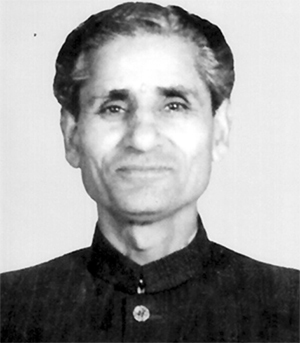Pran Pandit
Late Pandit Sarvanand Koul was born on November 02, 1924 at Sof-Shali. Perhaps a microcosm of Maraz (South Kashmir) is the village Sof-Shali (ancient Sanskrit name, Saft-Shaleshwar), which sits on the bank of River Brengi. Perched among the chain of mountains from three sides, Sof-Shali is a village in the vicinity of famous tourist resort of Kokarnag in Anantnag district.
Wonderful surroundings that bounteous nature provided this village include snow-clad mighty mountain tops at some distance, which send chill and fresh air to the village, as also the gushing water of a mountain-dashed clear stream (Koril) and springs of sweet water; and the beautiful stretches of green turf, walnut trees and vast almond and apple orchards, bushes and blooms of wild flowers on its plateaux and slopes.
Pandit Sarvanand Koul was popularly known as ‘Premi Ji, the name given to him by late Mehjoor. He prided himself as a native of Sof-Shali and poured his heart about the grandeur and beauty of the village in lyric passion as under: “Tren andun hendi baal shooban qodratik devar zan, Loleh-dariyavas bathis peth gah cho travan myon Gaam” (Mountains in three directions looking majestic walls of bounteous nature, on the Love-shore of the River is situated my village so glittering). The existence of ancient temple of ‘Shiv’, ‘Kaali Sathapna’ and the Shrine of Hazrat Baba Naseeb-ud-din Gazi, situated side by side, made the village a distinguished place that marked out ‘Shaivism’ and Sufi-ism (Tasawuf) as being in similar direction to God-realization.
Premi Ji’s father, Pandit Gopi Nath Koul used to spend most of his time in the company and service of Saints, Sadhus, Darveshes and Faqirs, who visited him regularly. This afforded Premi Ji an opportunity to serve and sit in the company of those endowed with dispassion and knowledge and his young mind was influenced by their discourses and discussions on eternality, virtues, knowledge and bliss.
I had my first informal interaction with him when I was just 17. After witnessing an open theatre performance (Band-Paether) by a local group at the Shrine of Hazrat Baba Naseeb-ud-din Gazi at Sof- Shali, while I was returning to my home, late Premi ji met me per chance. Enroute, I, of my curiosity and inquisitiveness, initiated a talk on ‘Sufism’. I wanted to know about the ‘Rishi Cult’ of Kashmir. He made me to fully understand what I was curious to know. What I grasped was: Hazrat Baba Naseeb-ud-din Gazi was a great mystic saint, who preached the message of love, brotherhood and communal amity among the masses; and unattached to the fruits of his Karma (actions), the mystic saint did all that was obligated to enrich the quality of the life of common man. He then switched over to Bhagavad-Gita and added that all genuine Sufi saints were Yogis; who were engaged in spiritual purification and through that they became liberated souls.
Late Premi Ji wanted to become a teacher so that he could strive with heart and soul to raise children up to highest perfections of mankind to share the huge responsibility of the future. He joined as a teacher in the Education department in 1956 and retired as Head Master from Government High School, Larrnoo (Anantnag). As teacher he proved his mettle and came up to the expectations of his students and created a niche for himself.
Premi Ji was a poet. His poetry is the blossom and fragrance of human knowledge, thoughts, passion, emotions and language. Shayir-e-Kashmir Mehjoor has acknowledged his poetic genius by recording “If the flower like ‘Premi’ is nurtured well to blossom to its full, the immense perfume of the flower shall make the garden of art and literature fragrant”. He has authored more than 24 books. His translation works of Bhagavad-Gita in Urdu verse; Ramayana in Kashmiri verse; Tagore’s Gitanjali in Kashmiri; and Russian folk tales in Kahmiri in a most simple and easy-to-understand manner are his outstanding contributions to the treasure-house of literature.
Premi Ji was a great human being; a man of dignity, honor and values; and a friend of needy and the poor. He was a freedom fighter and a firm believer of Ahinsa (non-violence).
During the intervening night of April 29/ 30, 1990, three masked men barged into the home of late Premi Ji and asked him to accompany them to their Master for some discussion; and he did not gaze with wonder on them neither was he panic-stricken. Premi Ji and his son, Virender Koul, accompanied the masked men and their dead bodies were found on May, 01, 1990. They were both brutally murdered. All those who knew Premi Ji very closely can say with authority that even when he may have seen his death as imminent, he must not have begged for his life by saying, “forgive me, have mercy,” and instead he must have gladly said to his tormentors, “If my Lord wills that, let me get killed at your hands”. The life of a worshipper of Ahinsa ended in Hinsa (violence).
(The author is a former superintendent of Police)
Trending Now
E-Paper


